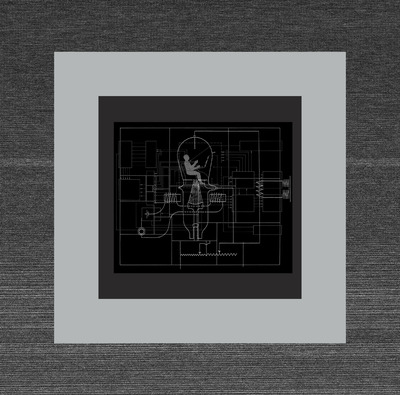Kunstkopf: 7 Stücke 1998
catalog no. 938.03
LP 2023
The open spaces in East Berlin that emerged for a handful of years in the 1990s, after the fall of the Berlin wall, have shown to be a fertile ground for musical and artistic experimentators to develop their play and showcase their findings, and to work together in ways that would have been impossible anywhere else. In retrospect, the reductionist brand of improvisation that has become known as Echtzeitmusik (real-time music) seems to overshadow other achievements, thus in hindsight it now is time to resurrect groups and artists that have worked at the non-classifiable fringes of what was already a sub-cultural scene.
One such group was Kunstkopf, formed in 1995 by Manfred Machlitt, Dirk Specht and Taymur Streng, and joined by Patrick Laschet shortly after, all musicians coming from very different backgrounds. Streng and Machlitt had been part of the underground electronic music scene in East Berlin. Streng had played in the dark-wave group Neun Tage Alt and at the same time experimented with synthesizers and sound-making devices in his home in the outskirts of Berlin, while also establishing contacts with the academic avant-garde, e.g. with the electro-acoustic studio of the East Berlin Academy of Arts. Streng later worked as a librarian until his untimely death in 2022. Laschet and Specht, on the other hand, came from a West German post-industrial DIY cassette scene but had been living in West Berlin for some time. Specht lives in Cologne today and is a member of the Therapeutische Hörgruppe Köln.
Kunstkopf was formed from the members' shared interest in various manifestations of electronic and experimental music, and their curiosity for finding a mutual language and mode of exchange through or despite their disparate backgrounds. In live settings, the group always improvised, never developing a repertoire through rehearsing, but embracing the challenging and erratic performance situation, while still positioning themselves fundamentally as a fixed ensemble, not a loose collective like other improvisers did. At the same time, the role of each member between musician, equipment whizz, composer, sound tinkerer and sound technician remained unclear.
After a hasty 4-day recording session in 1996, parts of which where released on the label ON/OFF in 2002, the group decided to eschew their live approach in favor of recording an album over time in Manfred Machlitt's private studio in his apartment. The process extended over a period of almost 2 years and involved multitrack recording, sequencing, overdubbing, software programming and an extensive post-production phase. Sound sources used were a variety of digital and analog synthesizers, various instruments including a Bechstein grand piano and a heavily processed violin, and a number of household objects. The group was aiming to achieve a pluralism of sounds as rich in contrast and colors as possible, opposing the reductionism played elsewhere in the city but never falling into expressionist trappings.
The pieces from Machlitt's home studio were finished in 1998 and have remained unreleased until now. Six of them are presented here, complemented by one live recording from the same year, thus making 7 pieces ("7 Stücke"). A unique artefact of their time and place, yet announcing and foreshadowing a profoundly different future. Edition of 300 in a beautiful black/white/silver sleeve with 4-sided insert with photos and detailed liner notes.
- Side A
- #1
- #2
- #3
- Side B
- #4
- #5
- #6
- #7
